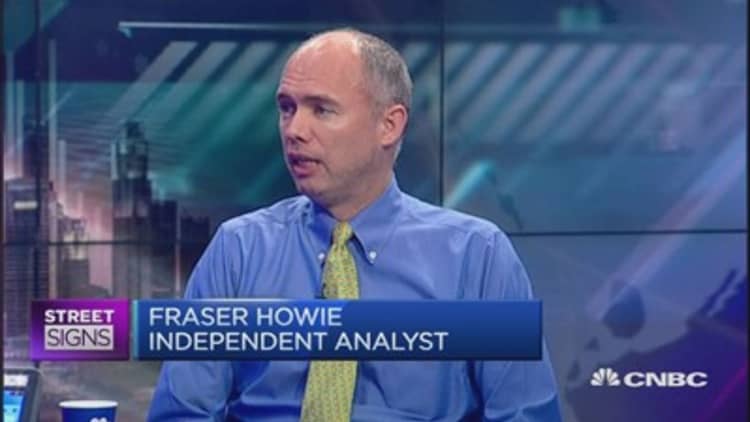Chinese stocks went on a rollercoaster ride over the past two days, with the action usually gathering speed and magnitude in the final hour of trading, leaving investors struggling to keep up.
On Tuesday the Shanghai Composite index came under sudden heavy selling an hour before the market close at 3pm local time. In the last hour of trading, the benchmark index more than doubled losses to close down 6.1 percent, chalking up its biggest one-day fall since July 27.
The next day, after being deep in negative territory for most of the session, the Shanghai bourse staged a late-day turnaround to finish 1.2 percent higher. Earlier in the day, the key stock index plunged as much as 5 percent to an intra-day low of 3,563.1.
The extreme fluctuations are certainly not a new phenomenon; they were common fixtures during the bear market rout in mid-June, but had tapered following the government's unprecedented rescue package last month. But this week's dramatic moves were less well-flagged.
"With a lack of news, the mystery of Tuesday's [fall] was baffling. Wednesday's moves were more predictable as [Tuesday's] plunge in share prices triggered a series of knock-on effects," Nicholas Teo, a market analyst at CMC Markets, told CNBC by phone.
Experts say there are a couple of factors that could cause the afternoon gyrations.
Read MoreShanghai markets suffer wild swings, more pain to come
1. Fragile market sentiment
Though the stock market has somewhat stabilized after a slew of official measures to arrest a sharp correction in June and July, investor sentiment remains fragile.
This has made mainland investors – retail traders make up around 80 percent of the Chinese market – susceptible to acting on rumors and misinterpreting market developments, according to IG's market strategist Bernard Aw, thereby sparking "sudden bouts of substantial slides" in equity markets.
Some market watchers have attributed Tuesday's whopping 6.1 percent slide to traders paring back their bets on support for the stock market, after the China Securities Finance Corporation (CSFC) said Friday it would not intervene further in the market unless there was unusual volatility and systemic risk. Aw thinks that investors may have overreacted to the comments.
"Nervous sentiment over the prospect of a further slowdown in growth is high. On top of that, you also see investors worrying over the withdrawal of support measures but [these worries] are overblown. Because the government isn't going to withdraw all at one go," Aw said. "So it seems that market participants were once again unduly misinterpreting the news."

2. Afternoon margin calls
The exact timing of margin calls may vary but it is common practice for brokerages to impose two margin calls on their clients; the first one in the morning session based on overnight moves in offshore markets and the second call in the afternoon session, said to be around 2pm in China, based on the day's trading.
Margin calls occur when brokerages request investors who have borrowed from them to either deposit further cash or to unwind their bets, if the market has fallen below levels the broker can stomach. According to analysts, the second margin call tends to be more significant in China, thereby amplifying the selling pressure in the afternoon trading sessions.
"When force-selling kicks in, people just dump their shares hence these blatant downward moves. The sad thing is that this market is so nervous that whenever there's a big move, the innocent man on the ground follows, fearing that he will be the last man standing," Singapore-based Teo from CMC Markets said.
Read MoreWorried about China? Avoid these U.S. stocks
3. Timing government support
Another factor underpinning the late-day swings in Chinese markets is the presence of state-backed buying. While these moves usually provide upward support for stocks, they can also work the other way.
"We [have noticed] bigger investors moving out of the market, perhaps worried about the repercussions of a slowdown and the government's crackdown on short sellers. So they used the opportunity of state support to exit positions ... and that usually happens towards the end of the trading session when state buying emerges," said Aw, adding that Beijing's "national team", a coalition of state-backed financial institutions and regulators, usually steps in during the final hour of trading, around 2-3pm local time.
However in recent weeks, authorities have been tweaking their market-support tactics in a bid to be less predictable, analysts say. This could have fueled concern among investors that state support for the stock market may be faltering.
"The [state buying at around 2pm] has become a predictable characteristic in the aftermath of the market crash. The likes of the CSFC are trying different tactics, just like how the People's Bank of China (PBOC) is going for a different strategy by devaluing the yuan. If I were a fund buyer, I wouldn't want the market to know my pattern as well," Teo told CNBC.
Independent analyst Fraser Howie agrees: "Remember they just inflated one of the world's biggest equity bubbles, they popped it and tried to support it, then a few days ago they said they are not going to support it or at least step in only if it's a real crisis. [With these changes,] you're going to get volatility."
4. Foreign selling
Analysts believe that foreign investors may have played a role in exacerbating the late-day trading action.
"There's been an absence of news that could have triggered [Tuesday's steep fall, which started] as soon as afternoon trading resumed. Thus, I think there could probably be overseas selling because by that time of the day, European sellers would have come online," Teo said.
Since the hemorrhaging began in mid-June, Chinese shares have gradually fallen out of favor with international investors. According to data from EPFR Global, net outflows from Chinese and Hong Kong equity markets reached $531 million in the week to August 12, marking the ninth week of outflows out of the past 10.

